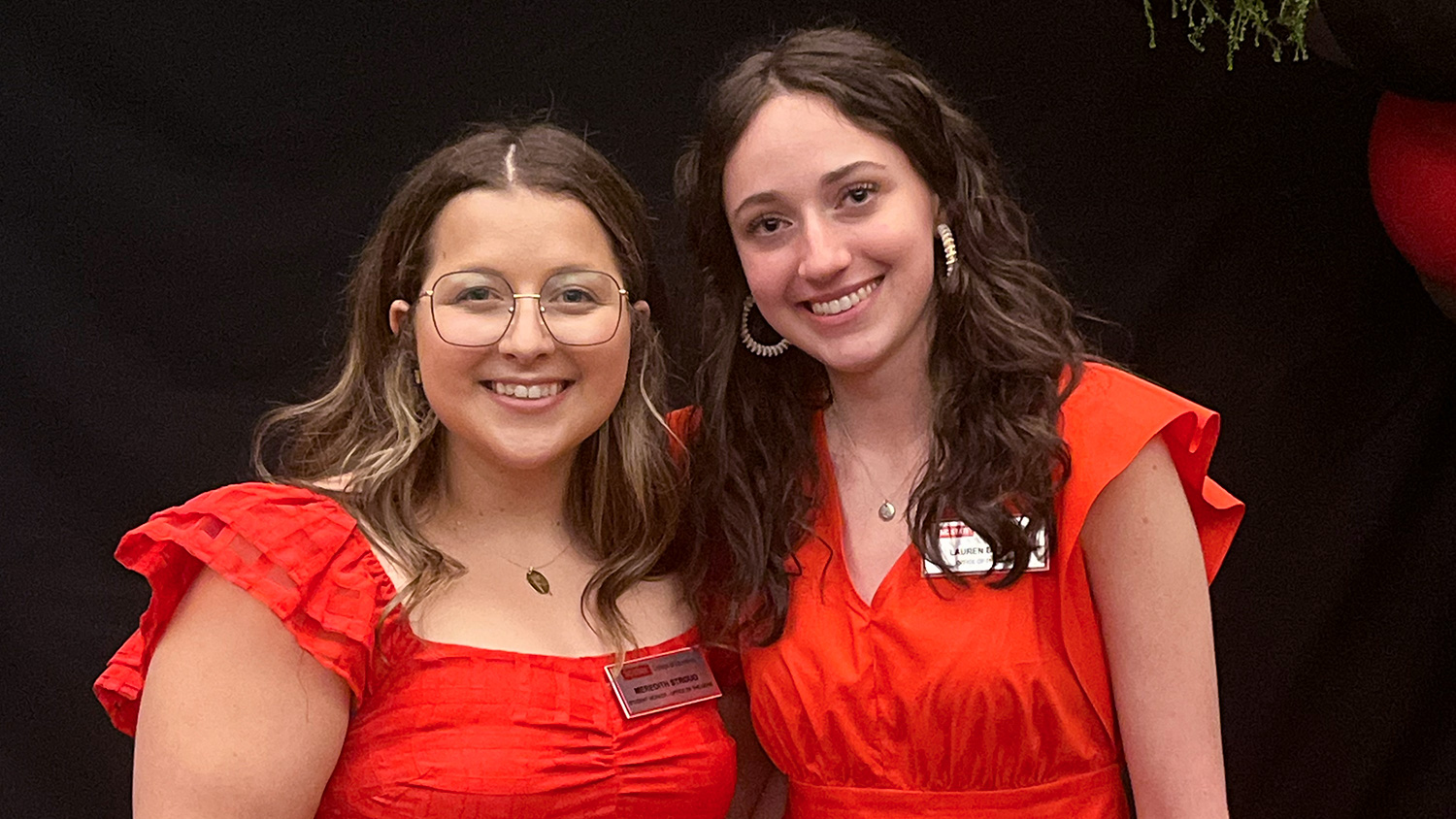3 College of Education Graduates Recognized with 2021 Outstanding Doctoral Dissertation Awards

Three NC State College of Education graduates were recognized for their research efforts when they were selected to receive the Outstanding Doctoral Dissertation Awards during the college’s May 2021 Virtual Graduation Ceremony.
Matt Reynolds ’20PHD, now an assistant teaching professor in the College of Education, won for the Department of STEM Education, Sarah Karamarkovich ’17MS, ’20MS, ’21PHD won for the Department of Teacher Education and Learning Sciences and Ezinne Ofoegbu ’21PHD won for the Department of Educational Leadership, Policy, and Human Development.
You can read more about these students and their award-winning dissertations in the pieces below.
Matt Reynolds ’20PHD — “From Fractured to Structured: A Study Examining the Characteristics of PCK and PCK Development of Preservice Science Teachers in an Undergraduate Teacher Preparation Program”
As a former middle and high school science teacher, Matt Reynolds ’20PHD was always developing and trying to hone his craft to become a more effective teacher, but he didn’t initially realize there was a term for what he was doing.
Once he learned about the concept of pedagogical content knowledge (PCK), which is the intersection of teaching abilities and content knowledge, he wanted to know more about how it develops, specifically in pre-service teachers.
“PCK is well researched in in-service teachers, but almost never researched in pre-service teachers. So, there’s research about what PCK looks like standing still, once it’s been developed, but I wanted to know what it looks like when you’re making it and examine if certain pieces come together more quickly than others,” Reynolds said.
For his dissertation, Reynolds looked at a group of six pre-service teachers and tracked their PCK development to determine how they developed their knowledge for teaching over the course of their last year in a teacher preparation program.
As the winner of an Outstanding Doctoral Dissertation Award, Reynolds said that he is honored to be recognized for his work, but is most proud of the fact that he has been able to implement his findings through his role as an assistant teaching professor and program coordinator in the College of Education’s Department of STEM Education.
While all doctoral candidates conclude their dissertations with recommendations based on their research findings, not everybody is in a position to immediately implement them in the field. In his role, however, Reynolds said he has been able to immediately influence pre-service teacher education through programmatic recommendations and a better understanding of how to help his students develop a PCK knowledge base.
“My research has helped me understand the supports that I need to put in place as a teacher educator to help get my students to the next step,” Reynolds said. “I’m excited to be honored with the award, but I’m really excited about what my research and my research line is going to be able to do for the pre-service teachers I’m working with now and to be able to disseminate my work out to other teacher educators.”
Sarah M. Karamarkovich ’17MS, ’20MS, ’21PHD —“Trends and Patterns in Mathematics Motivation During Elementary School: Combining Variable-Centered and Person-Centered Approaches”
Sarah Karamarkovich ’17MS, ’20MS, ’21PHD has always been interested in students’ math motivation and the ways in which students learn fractions. When she wrote her master’s thesis, she explored the types of errors children make when solving fraction problems, and had planned to expand on that research for her dissertation.
However, when the COVID-19 pandemic hit, she was unable to go into schools to interview teachers and students, so she pivoted her research focus so that she could use data that had already been collected.
Her updated dissertation focused on the trends and patterns of students’ mathematics motivation using a variety of studies that combined variable-centered and person-centered approaches.
“I think the general idea that learning is influenced by how we feel is something that everybody knows as either a student or an educator,” Karamarkovich said. “There’s a lot of prior research that looks at how motivation changes on a yearly basis and I wanted to take a closer look at what was happening within the school year, because that’s realistically when students are going to be most likely to change their motivations and emotions because that’s when they’re actually doing the things we’re asking them about.”
Karamarkovich first used a longitudinal method to look at how students’ math motivation fluctuated over the course of two years and then used a person-centered approach to examine profiles of student emotions. She then looked at both approaches and pioneered an analysis to profile change, identify different patterns and see how motivation fluctuates.
After spending six years as a graduate student, and writing a dissertation during the pandemic, Karamarkovich said that having her work recognized with an Outstanding Doctoral Dissertation Award has been surreal.
“I think, like every other person in a doctoral program, I had a lot of imposter syndrome, so to hear that I passed my dissertation and to hear someone call me ‘doctor’ for the first time was just incredible. Then, to get this award, is beyond what I really could have imagined,” she said.
Karamarkovich said that her time in the Ph.D. in teacher education and learning sciences educational psychology program area of study helped to prepare her for her new job as an educational data analyst for Petersburg City Public Schools in Virginia by helping her develop skills to both know what to do with data and understand the context around it.
In her new role, she said her goal is to use what she learned in the College of Education to help improve educational outcomes through data-based decisions.
Ezinne Ofoegbu ’21PHD — “‘Being a Black Woman Means Strength’: An Exploration of the College Experiences and Identity of Black Women Student-Athletes at Predominantly White Institutions”
When Ezinne Ofoegbu ’21PHD was a master’s student in California, she spent a lot of time working with student athletes and noticed discrepancies in how Black female students were perceived in their classes, athletic environments and through the way women’s sports were generally undervalued by the public in comparison to men’s sports.
Her Black female students shared experiences of being the only person of color in their classes or on their teams and of being stereotyped and micro-aggressed by non-Black professors, teammates and classmates who were not athletes. As a doctoral student, Ofoegbu wanted to understand if these experiences were happening across the board for all Black female student athletes.
“I really wanted to ground those experiences in research so that practitioners can reimagine ways to support students in this space, but also create an environment that is more inclusive of the cultural wealth that they bring into that space,” she said.
Ofoebgu’s dissertation examined the gendered and racialized experiences of Black female student athletes, focusing on how the intersections of their gender and racial identity impacted the way that they navigated different political and athletic environments that have historically valued predominantly white and male norms.
To have her work honored with an Outstanding Doctoral Dissertation Award, she said, has been affirming to her as both a scholar and a Black woman because it signifies that this research is considered valuable in higher education.
“A lot of college sports research is typically pushed into the sports management or sports administration scholarly space, so to have this topic be valued in an education environment is really important and it’s affirmation that this work needs to continue happening,” she said. “It’s affirmation that I’m doing the right thing and that what I’m doing is working and people see the value in it.”
One of the most impactful experiences from her time as a doctoral student in the Department of Educational Leadership, Policy, and Human Development, Ofoegbu said, has been having an advisor who was also a Black woman.
She said that the mentorship and guidance she received from Professor Joy Gaston Gayles, Ph.D., has been invaluable and provided her with an example of what it is like to be a Black woman in academia.
“It’s sad that in 2021 there are still so few of us in these positions, but I’m also motivated by the fact that there are so few of us and I’m hoping, in my career, to provide mentorship and advising in the same way that Dr. Gayles did for me to other Black women who want to come in and do this work,” she said.
- Categories:


